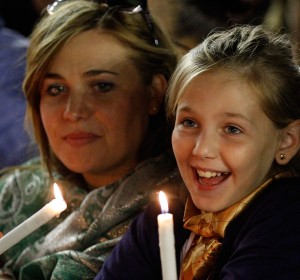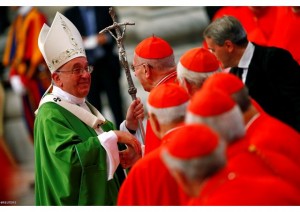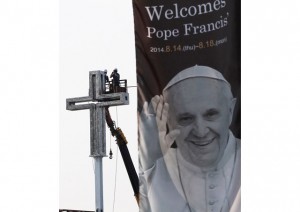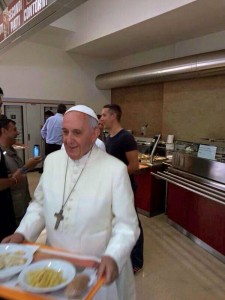 Dear families, good evening!
Dear families, good evening!
The evening falls on our assembly.
It is the hour in which one willingly returns home to the same meal, in the thick of affections, of the good that has been done and received, of the encounters which warm the heart and make it grow, good wine which anticipates in the days of man the feast without end.
It is also the most weighty hour for he who finds himself face to face with his own loneliness, in the bitter twilight of broken dreams and plans: how many people trudge through the day in the blind alley of resignation, abandonment, even resentment: in how many homes was the wine of joy less plenty, therefore, the zest – and the wisdom – of life. For one another we make our prayer heard.
It is significant how – even in the individualistic culture which distorts and renders connections fleeting – in each person born of a woman, there remains alive an essential need of stability, of an open door, of someone with whom to weave and to share the story of life, a history to which to belong.
The communion of life assumed by spouses, their openness to the gift of life, the mutual protection, the encounter and the memory of generations, educational support, the transmission of the Christian faith to their children . . . With all this, the family continues to be a school without parallel of humanity, an indispensable contribution to a just and united society. (cfr Esort. ap. Evangelii gaudium, 66-68).
And the deeper its roots, the more it is possible in life to leave and to go far, without getting lost or feeling out of place in foreign lands.
This horizon helps us to grasp the importance of the Synodal assembly, which opens tomorrow.
Already, the “convenire in unum” surrounding the Bishop of Rome is an event of grace, in which episcopal collegiality is made manifest in a path of spiritual and pastoral discernment.
To search for that which today the Lord asks of His Church, we must lend our ears to the beat of this time and perceive the “scent” of the people today, so as to remain permeated with their joys and hopes, by their sadness and distress, at which time we will know how to propose the good news of the family with credibility.
We know, in fact, as in the Gospel, there is a strength and tenderness capable of defeating that which is created by unhappiness and violence.
Yes, in the Gospel there is salvation which fulfills the most profound needs of man! Of this salvation – work of God’s mercy and grace – as a Church, we are sign and instrument, a living and effective sacrament.
If it were not so, our building would remain only a house of cards, and pastors would be reduced to clerics of state, on whose lips the people would search in vain for the freshness and “smell of the Gospel.” (Ibid., 39).
Thus emerges also the subject of our prayer.
Above all, we ask the Holy Spirit, for the gift of listening for the Synod Fathers: to listen in the manner of God, so that they may hear, with him, the cry of the people; to listen to the people, until they breathe the will to which God calls us.
Besides listening, we invoke an openness toward a sincere discussion, open and fraternal, which leads us to carry with pastoral responsibility the questions that this change in epoch brings.
We let it flow back into our hearts, without ever losing peace, but with serene trust which in his own time the Lord will not fail to bring into unity.
Does not Church history perhaps recount many similar situations, which our Fathers knew how to overcome with persistent patience and creativity?
The secret lies in a gaze: and it is the third gift that we implore with our prayer. Because, if we truly intend to walk among contemporary challenges, the decisive condition is to maintain a fixed gaze on Jesus Christ – Lumen Gentium – to pause in contemplation and in adoration of His Face.
If we assume his way of thinking, of living and of relating, we will never tire of translating the Synodal work into guidelines and paths for the pastoral care of the person and of the family.
In fact, every time we return to the source of Christian experience, new paths and un-thought of possibilities open up. This is what the Gospel hints at: “Do whatever he tells you.”
These are the words which contain the spiritual testament of Mary, “the friend who is ever-concerned that wine not be lacking in our lives” (EV 286). Let us make these words ours!
At that point, our listening and our discussion on the family, loved with the gaze of Christ, will become a providential occasion with which to renew – according to the example of Saint Francis – the Church and society.
With the joy of the Gospel we will rediscover the way of a reconciled and merciful Church, poor and friend of the poor; a Church “given strength that it might, in patience and in love, overcome its sorrows and its challenges, both within itself and from without.” (Lumen Gentium, 8)
May the Wind of Pentecost blow upon the Synod’s work, on the Church, and on all of humanity. Undo the knots which prevent people from encountering one another, heal the wounds that bleed, rekindle hope.
Grant us this creative charity which consents to love as Jesus loved. And our message may reclaim the vivacity and enthusiasm of the first missionaries of the Gospel.
 The Pope’s intentions for November
The Pope’s intentions for November


